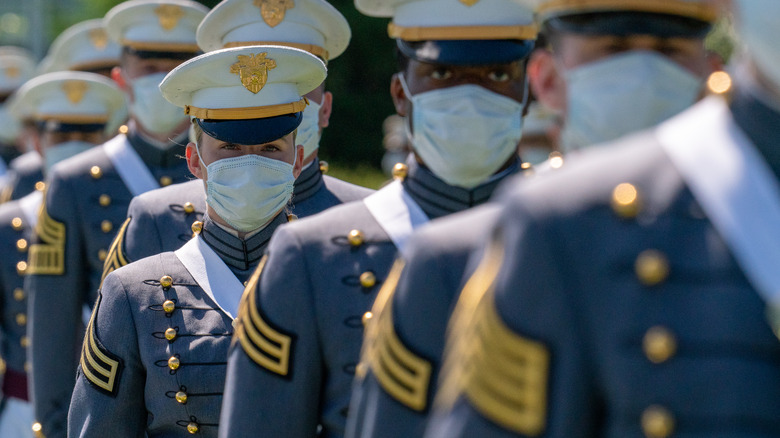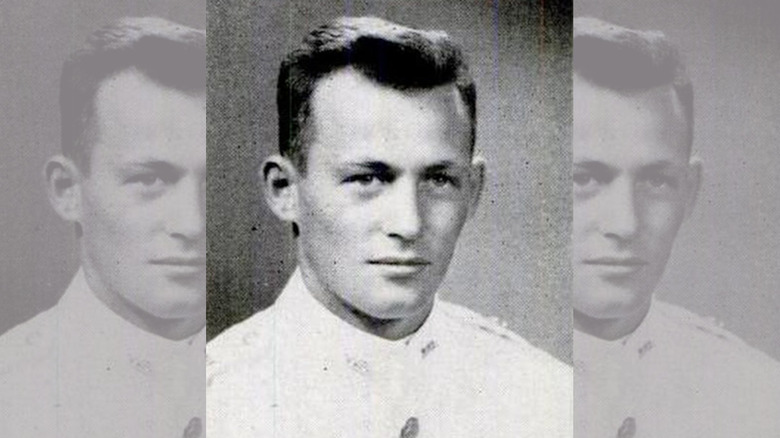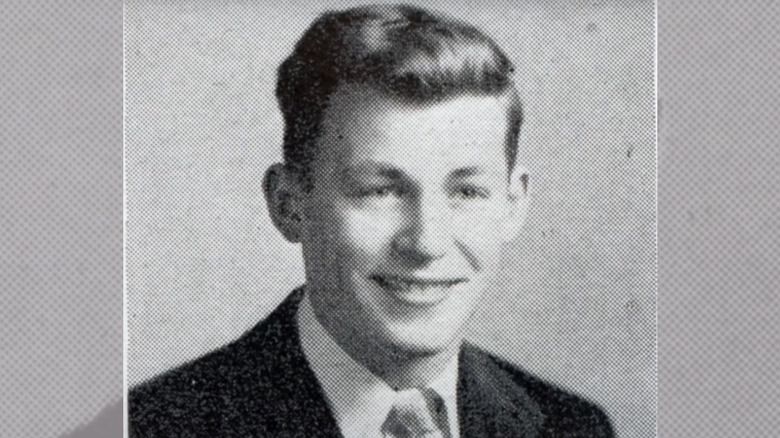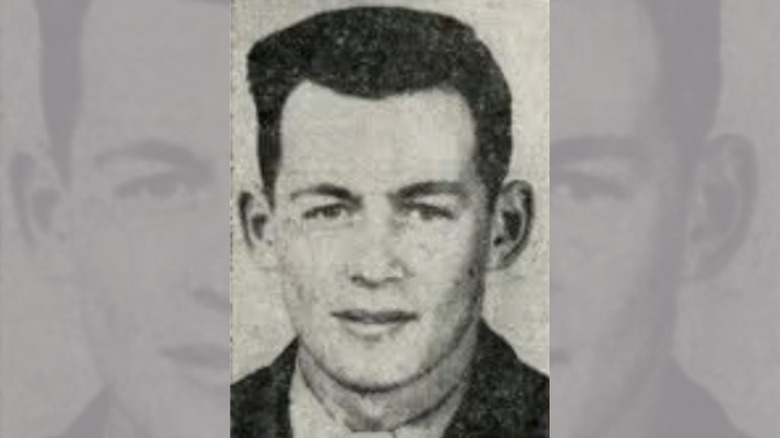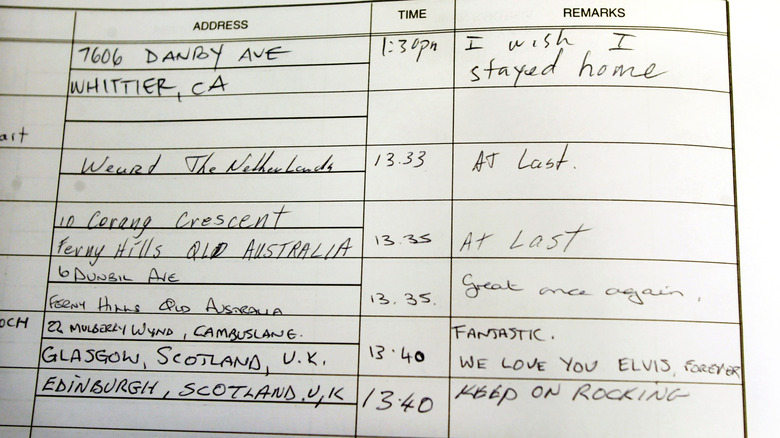The Mystery Of The Only Cadet To Go Missing From West Point
The United States Military Academy, also known as West Point Academy or simply West Point, is one of the most respected institutions of higher learning in the country. Founded in 1802, it's one of the oldest military service academies in the world, steeped in tradition and a deep and deeply American mythology. Some of the most successful American leaders of all time have graduated from West Point, including William Tecumseh Sherman, Ulysses S. Grant, Dwight D. Eisenhower, and Edwin "Buzz" Aldrin.
As a military institution charged with training the leaders of tomorrow, you might imagine that West Point runs a pretty tight ship — and you would be right. Cadets are held to high standards of behavior, and their life is very controlled and monitored while in attendance. With a little more than 1,000 cadets in each class, the logistics of keeping track of them all isn't very challenging, especially considering that cadets typically need permission to leave the campus and have to sign in and out when they do so. Unsurprisingly, West Point has almost never lost a cadet as a result.
In fact, in its entire history stretching more than 200 years, West Point has had only one cadet go missing. On January 14, 1950, a cadet named Richard Colvin Cox signed out of his dorm to meet a friend — and was never seen again. Here's the mystery of the only cadet to go missing from West Point.
He already had military experience
According to Richland Source, Richard Colvin Cox was born in Mansfield, Ohio, in 1928. Per Front Page Detectives, after graduating high school, Cox volunteered for the United States Constabulary, a force organized in the wake of World War II to provide security and policing services in a shattered Germany. He was assigned to a unit in Coburg, Germany, and the military life obviously appealed to him — LIFE reports he applied to and entered West Point as a plebe in 1948.
All the evidence points to Cox being well-suited for military life. His service in Germany was beyond reproach, and when he applied to West Point, his application was supported by his superiors and went through without a problem. Once in West Point, he continued to thrive in the military lifestyle as far as anyone could tell. By all reports, he did well at the Academy — he ranked in the upper third of his class, had no blemishes on his record, and in his second or "yearling" year, his fellow cadets voted him "top yearling" (via LIFE). Richard Cox seemed on his way to having a solid, if not exemplary, military career, and more importantly, he seemed well suited for such a life.
There were no warning signs
When someone vanishes without a trace, it's easy to imagine they must have been terribly unhappy, or in some kind of trouble. Why else would you walk out of your life and never look back, leaving friends, family, and lovers with no closure?
But as noted by The Washington Post, in the days and weeks before Richard Colvin Cox vanished, there were exactly zero clues that he was contemplating such a dramatic decision, or that he was in any sort of trouble. Right up until the day before his disappearance, he remained in contact with his fiance, Betty, and his mother, Minnie — and said nothing out of the ordinary. According to Assembly, after his disappearance, Cox's mother stated that there had been no indication he was contemplating leaving West Point, and that she had no reason to suspect any sort of crime.
Cox had, in fact, just returned from Christmas vacation at home with his family and Betty, and according to LIFE, was in "good spirits." While some of his fellow cadets later recalled that Cox sometimes seemed depressed, that's hardly unusual for young people in high-pressure environments like West Point, and as far as anyone knows, he never spoke about being unhappy at West Point, being in trouble, or contemplating any sort of dramatic gesture. In fact, Cox spent the day before his disappearance taking in a basketball game with his roommate Deane E. Welch (via Front Page Detectives) — not exactly the actions of a worried man.
He was visited by a mysterious man
According to LIFE, one week before Richard Colvin Cox disappeared without a trace, a man telephoned his barracks asking for him and left his name as George. He stated that they knew each other from Germany, where Cox had served in the United States Constabulary a few years before. The Washington Post reports that Cox met with George, but offered a negative impression of the man to his roommates, telling them that George was taking up too much of his time and was unpleasant to be around. He made a few shocking comments about George, saying that he boasted about how many men he'd killed, and that he'd murdered a girlfriend when she'd become pregnant.
A week later, Cox once again met a civilian friend and signed himself out for dinner. Although it seems very likely it was the same man, there were differences in how the civilian was described by a different set of witnesses — blond instead of dark-haired, shorter and lighter overall. When Cox returned to his room, however, he indicated it was George again, and that they had made plans to have dinner together again.
George was never identified, despite an intense search for him after Cox's disappearance. A soldier with the last name "George" had served with Cox, but when he was investigated, it was quickly determined he was elsewhere in the country at the time. Other possible men were investigated, but all had rock-solid alibis.
Cox altered records
The Washington Post makes it clear there were no signs that Richard Colvin Cox was in any sort of trouble or suffered from emotional or mental problems prior to his disappearance. He was engaged, popular with his peers, and performing well in his classes. When he vanished from West Point without a clue, the possibility of foul play seemed very strong as a result.
But Cox's behavior wasn't entirely innocent. According to Hudson Valley Magazine, when Cox left the barracks with his mysterious friend George a week before his disappearance, the two men simply sat in George's car drinking whiskey, and Cox returned to his room intoxicated, and quickly passed out at his desk. His roommates, amused, even took a photo of him as he slept as a prank.
Author Harry J. Maihafer notes in his book "Oblivion: The Mystery of West Point Cadet Richard Cox," that at some point Cox crept from his room and altered the entry in the barracks log book to make it seem as if he'd returned an hour earlier than he actually had. This was a violation of the Cadet Honor Code at West Point and it may have resulted in his expulsion if discovered — so it wasn't something a cadet would do lightly. While it's possible he lied simply to avoid getting into trouble, it's suspicious that the one time an otherwise exemplary cadet would break the rules coincided with his meeting a mystery man who may have been involved in his disappearance.
A mysterious Alice was name-checked
As reported by Assembly, when Richard Colvin Cox arrived at West Point, he was engaged to a woman named Betty Timmons back in Ohio. A week before Cox disappeared, he met a mysterious man named George. According to Hudson Valley Magazine, the two men sat in George's car drinking whiskey. LIFE reports that Cox returned to his room inebriated, and quickly passed out at his desk. One week later, Cox would meet George again for "dinner" — and never be seen again.
Things took an interesting turn as Cox slept off his drunken first meeting with George, however. Front Page Detectives reports that at some point, Cox woke up from his drunken slumber, ran out into the hall, and shouted the name "Alice." His roommate asked him who Alice was, but Cox ignored them, returned to his room, and fell asleep again.
Since Cox's fiance was named Betty, this could be a clue as to his eventual fate, or his relationship to the mysterious man named George. But no Alice has ever been identified in connection with Cox. Per The Washington Post, a letter Cox wrote to a female friend in December 1949 was returned as undeliverable, but when opened, made no mention of Alice — or George. It's been speculated that Alice might have been a girlfriend of Cox's in Germany, but no such woman has ever been found.
He may have disappeared voluntarily
When Richard Colvin Cox initially disappeared, the focus of most theories was foul play — had Cox been kidnapped? Murdered? Suffered a breakdown? West Point continued to list Cox as Away Without Official Leave (AWOL) instead of charging him with the more serious crime of desertion, implying a belief that if he had abandoned West Point, it was an impulsive move and not a planned one, the sort of thing one might do after suffering a breakdown of some sort.
But there was no evidence to support any of these theories, really. As noted by LIFE, Cox didn't appear to fear George in any way, and the logistics of murdering a West Point cadet and somehow hiding or smuggling the body off the grounds are pretty challenging. Which has led some to posit the other possibility: That despite the appearance of happiness, Cox voluntarily vanished and left his life behind — and never looked back.
Assembly notes that a review of Cox's writings reveals some dissatisfaction with his West Point experience and some doubts about marrying Betty. Front Page Detectives reports that the day after his disappearance, January 15, 1950, was circled on his calendar with no indication as to why. And for years after Cox's disappearance, people reported seeing him. While none of these sightings were verified, the tantalizing possibility remains that Cox left his life behind, assumed a new identity, and spent the rest of his days hiding from his family and old friends.
He left money and clothes behind
One reason many people don't believe Richard Colvin Cox had a plan to disappear deliberately is the fact that he left several items behind in his room that would have been extremely useful to him if he had.
First, as reported in "Oblivion: The Mystery of West Point Cadet Richard Cox," Cox left a large sum of money behind. A search of his room after his disappearance found $60 in cash and a check for $25 made out to him. In today's money, that would be worth more than $1,000. It seems unlikely Cox would leave those funds behind if he was making a run for it. He also left a gold watch that his roommates stated he seemed to value highly — and even if he didn't really care about the watch, it's value would have been a good reason to take it with him anyway.
According to Front Page Detectives, Cox also left two suits of civilian clothing behind in his room. This would have been a lucky break for a man planning to flee West Point, because normally civilian clothing wasn't allowed in the barracks. Cox's clothes had just been returned from the cleaners — yet he left them there, and wore his uniform and gray overcoat when he left, making it very difficult for him to blend in once he left the West Point grounds.
The manhunt was huge
LIFE notes that it took some time for the alarm to sound concerning Richard Colvin Cox's disappearance. He was officially due back in his room by 11 p.m. at night, but cadets were routinely late and no one thought much about his failure to turn up. At 1 a.m. in the morning, however, his absence was noticed, and at 2:30 a.m., it was reported to the tactical officer, who noted it but was used to cadets occasionally breaking the rules. It wasn't until the next morning that Cox was officially reported missing.
Richland Source reports that what ensued was one of the largest manhunts ever staged in U.S. history. Helicopters were deployed to search the West Point grounds for a body, and soldiers were brought in to form search parties. The pool was drained, the nearby lake was dragged, and every nearby building was searched. The massive manhunt went on for two long months and turned up exactly zero clues — not even a trace of Richard Cox was ever found outside a few unsubstantiated sightings.
West Point continued to call Cox's name at roll call every morning for three months, finally removing him from the rolls on March 15, 1950. Per The Washington Post, in 1957, the state of Ohio officially declared Richard Colvin Cox dead. The investigation remained a cold case.
Cox may have been spotted
There are several reasons some people believe Richard Colvin Cox left West Point voluntarily — and managed his own disappearance. He had expressed some doubts about his career and his impending marriage, for example, and didn't appear to be distressed or worried about anything when he left the barracks for the last time in January 1950.
One of the most compelling pieces of evidence suggesting Cox may have vanished on purpose was noted by The Washington Post: Purportedly, Cox was spotted some four years after his disappearance at a Greyhound bus station in Washington D.C. According to Front Page Detectives, he was seen there by a man named Ernest J. Shotwell, Jr., who had attended the United States Military Academy Preparatory School with Cox a few years before his entry into West Point and subsequent disappearance.
According to Shotwell, he wasn't aware that Cox was missing when he saw him, and he reported that Cox seemed "uncomfortable" and evaded questions about his future. Per "Oblivion: The Mystery of West Point Cadet Richard Cox," Shotwell was asked if he would be willing to take a lie detector test to support his claims, and he said that would.
It's possible he defected
By 1950, the Cold War was in full swing, and the "Red Scare" had gripped the United States. A growing fear of the U.S.S.R. and communist influence within the United States had led to official "loyalty oaths" (via The First Amendment Encyclopedia) for federal employees and paranoid investigations in the U.S. congress. So when Richard Colvin Cox vanished from West Point, it's no surprise that some investigators looked at the case through the lens of espionage — and they didn't come up entirely empty.
According to "Oblivion: The Mystery of West Point Cadet Richard Cox," notes Cox left behind indicated he was making an attempt to learn how to speak Russian. The Washington Post reports this was confirmed in a letter Cox had written to a woman in Germany just a few weeks before his disappearance, in which he also asked pointedly "What is the Russian situation in Lichtenfels and vicinity? ... I'm very interested in the Russian situation." LIFE explains the rest of the contents of the letter were innocuous, with Cox simply desiring correspondence and expressing uncertainty that the woman would even remember who he was. But that makes the question stand out even more.
Neither of these pieces of evidence proves anything, of course. But considering how thoroughly Richard Colvin Cox vanished, the possibility that he crossed over to the Soviets at the height of the Cold War can't be completely discounted.
Cox may have become a spy
According to LIFE, Richard Colvin Cox served with the United States Constabulary in Germany prior to entering West Point. But Hudson Valley Magazine reports that he served as an intelligence officer, and there are reasons to think it possible that Cox's 1950 disappearance had everything to do with becoming a spy.
According to Richland Source, an old friend of Cox's, William F. McKee, eventually became Richland County prosecutor. While in the Ohio FBI office one day, McKee asked to see the bureau's file on Cox — and the agent "visibly turned pale" and gave excuses why the file couldn't be produced. A few years later, he made another request to see the Cox file, and once again the files never showed up. In 1982, a journalist was finally able to get the Cox file and discovered it was heavily censored, and 165 pages were simply missing. The whole experience implies that someone in a position to do so wanted to prevent anyone from seeing the results of the investigation in Richard Colvin Cox's disappearance.
While it's also possible the FBI wanted to keep the details secret due to embarrassment over the lack of progress, it's also consistent with the idea that Cox, who had experience working in intelligence, was recruited by the CIA or some other agency.
A CIA agent indicated that Cox was alive
In "Oblivion: The Mystery of West Point Cadet Richard Cox," author Harry J. Maihafer reports that it's possible Richard Colvin Cox didn't disappear at all, but was recruited into the CIA. At the time of Cox's disappearance, the CIA (which had just been formed in 1947) was actively recruiting former soldiers with experience serving outside the U.S. Since Cox had some experience working in intelligence in Germany (via Hudson Valley Magazine), he was ideally qualified. Some investigators speculated that the mysterious man called "George" who visited Cox shortly before he vanished was in fact a man named David Westervelt, who had supervised Cox in Germany, and who may have been a recruiter for the CIA.
According to Front Page Detectives, a former FBI agent stated that the bureau had been within 24 hours of catching Cox but were "pulled off the case," implying a higher authority was protecting Cox. Per Maihafer (via Assembly), a highly placed CIA officer confirmed that Richard Colvin Cox was still alive but had no desire to come forward and speak to anyone. The CIA contact also implied that Cox was ill with cancer and on his deathbed. The possibility that this was a falsehood designed to discourage further inquiry is possible, of course.
